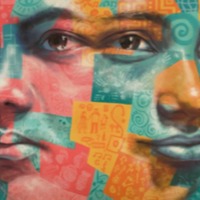
I was a 22-year-old single mother, desperate for work when I left my son with family and travelled to Osh to find work. I didn’t have a Kyrgyz ID, or a university degree so it was hard to find work, until a woman told me about a waitressing job in Bishkek.
When I arrived in Bishkek, it wasn’t as it seemed. They held us in an apartment and took away our passports. They told us that we’d be photographed again for our new employment documents, to be registered as waitresses. It felt strange, but we believed them.
We were put on the plane without passports and told that a pilot will bring our passports back to us. When the pilot came with our documents we realized that the passports were not ours. They were fake.
We travelled to Dubai, and were taken to another apartment full of women. “Great, fresh arrivals, we’ll work much less now,” the women said. We were to be sex slaves and do whatever the clients wanted. The next day I was sent to a nightclub and told that I would have to earn at least $10,000 by the end of the month.
For 18 months, this is all I did. We were never allowed to go anywhere unaccompanied. I could not bear it anymore. One night I walked out of the nightclub and saw a police car approaching. Instead of running away like the others, I stayed put and let them catch me. I was deported back to Osh, and since my ID was fake, I spent a year in jail. I filed a police report, and three of the traffickers were captured.
Once I was out of jail, I was on the streets, ashamed, and unemployed. I went back to the sex industry. I was working in local saunas when the outreach workers of the organzition Podruga found me. They offered me work. I wasn’t sure that I would fit in, but slowly I began to trust them. For the last two years, I am working with Podruga as an outreach worker.
I got married again; my husband knows everything about my past and does not judge me. “Go forward,” he says, “and don’t look back. We are a family now, that’s all that matters.”
Every day, I go on outreach missions, visiting saunas and other places in Osh where sex workers may be. I deliver condoms and talk to women about the dangers of contracting HIV, informing them about health and safety measures, legal aid and providing other support.
I often meet girls who dream of going to Turkey and Dubai, to earn more. I tell them, please don’t go. I tell them how I was sold to sex slavery. I did not earn much money, I only collected occasional tips with which I could buy cigarettes and other small things, and send some money home. All the money we earned went to the pimps who abused us. One of them was fond of using a hot iron on us. There is nothing good for you there.
My job with Podruga is to make sure that the girls stay clean, that they are safe and if they are in pain I take them for regular hospital checkups. But to stop trafficking of women and girls, we have to inform people about the full consequences of human trafficking and how to detect the signs. It is critical to start raising awareness about this in schools, starting young, so that they do not become victims. At the same time, there’s dire need for legal aid and psychological support for returnees.”
Narrative provided by UN Women









